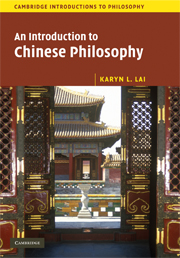Book contents
- Frontmatter
- Contents
- Preface
- List of Dates
- 1 Chinese Philosophy
- 2 Confucius and the Confucian Concepts Ren and Li
- 3 The Cultivation of Humanity in Confucian Philosophy: Mencius and Xunzi
- 4 Early Mohist Philosophy
- 5 Early Daoist Philosophy: The Dao De Jing as a Metaphysical Treatise
- 6 Early Daoist Philosophy: Dao, Language and Society
- 7 The Mingjia and the Later Mohists
- 8 Zhuangzi's Philosophy
- 9 Legalist Philosophy
- 10 The Yijing and its Place in Chinese Philosophy
- 11 Chinese Buddhism
- Postscript
- Glossary
- Bibliography
- Index
9 - Legalist Philosophy
- Frontmatter
- Contents
- Preface
- List of Dates
- 1 Chinese Philosophy
- 2 Confucius and the Confucian Concepts Ren and Li
- 3 The Cultivation of Humanity in Confucian Philosophy: Mencius and Xunzi
- 4 Early Mohist Philosophy
- 5 Early Daoist Philosophy: The Dao De Jing as a Metaphysical Treatise
- 6 Early Daoist Philosophy: Dao, Language and Society
- 7 The Mingjia and the Later Mohists
- 8 Zhuangzi's Philosophy
- 9 Legalist Philosophy
- 10 The Yijing and its Place in Chinese Philosophy
- 11 Chinese Buddhism
- Postscript
- Glossary
- Bibliography
- Index
Summary
To greater or lesser extents, the debates during the Spring and Autumn and Warring States periods challenged the beliefs and practices of the status quo. We have seen the case of Confucianism, which upheld many aspects of traditional life yet raised questions about possibilities for self-directed accomplishments and the basis of political authority. Daoism rejected many more facets of conventional life and practices but retained a vision of the good life for the common people. Legalist thought is singular in its rejection of fundamental tenets of then contemporary life. It rejected the importance of relationships in aspects of life, especially in the public domain, the influence of the bureaucracy, the institutional fostering of ethical awareness, and perhaps most of all the idea of a compassionate government that existed for the sake of the people. Herrlee Creel, a historian of Chinese thought, argues that Legalist philosophy was, ‘in considerable degree, a philosophy of counterrevolution’ (1953: 135). Creel argues that the Legalists rejected the increasingly popular view that government exists for the people (promoted by most of the other schools, especially by the Confucians) and in its place proposed government for the sake of the ruler.
The classification by Sima Tan, the Han Dynasty historian, of Legalist philosophy as a ‘school’ (fa jia: school of law) is misleading in a number of ways.
- Type
- Chapter
- Information
- An Introduction to Chinese Philosophy , pp. 172 - 198Publisher: Cambridge University PressPrint publication year: 2008
- 1
- Cited by



